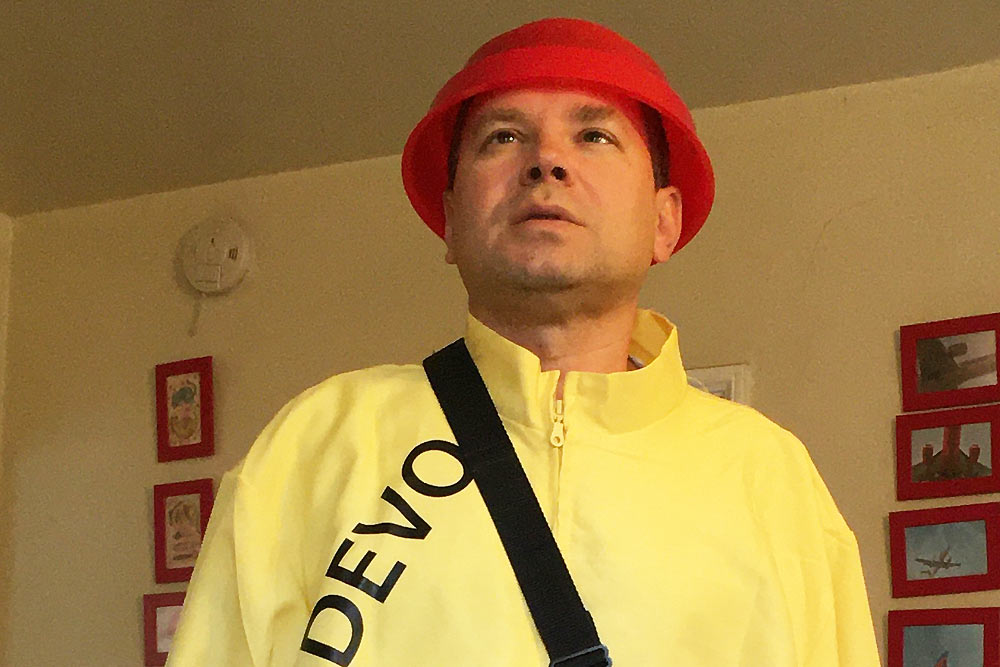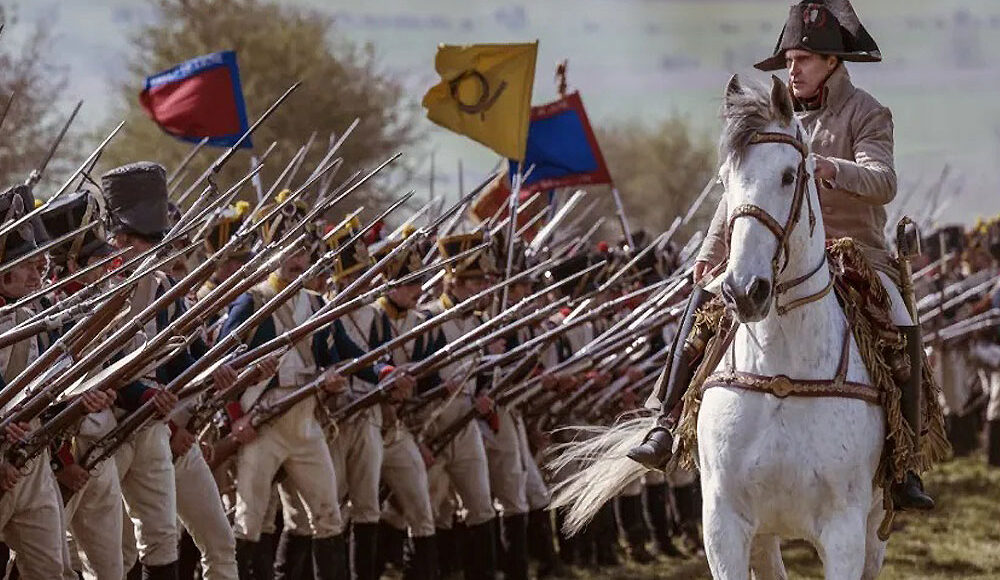By Nicusor Ciumacencu — Growing up, I remember Mom obsessed with Napoleon, reading any book she could find about his life and his stunts. She talked to me about what a man Napoleon was, about Josephine and all his other amorous adventures. and now, as an adult, I can understand her infatuation with that man, how she secretly adored him and wished perhaps she had lived during his time, the early 19th century.
She wasn’t just telling me about the amorous sensational. I remember learning how Napoleon himself apparently knew the names of most of his soldiers and how they adored him as well and were ready to give their lives on the battlefield for him, their God. And that was true if you look at his many successes impossible to achieve without the many men who blindly followed him. I expected to get the same feeling watching the newly released movie, Napoleon – the feeling that I met and understood such a unique character.
A life in a movie and a movie in a life.
That can work if we talk about any life, any mediocre, ordinary existence that can be fit in two to three hours of screening time. But when it’s Napoleon’s life perhaps five hours wouldn’t be enough to fully develop an entire military, political and personal life that is particularly intense and intricate, remarkable and influential, destructive and catastrophic all at once, as Napoleon’s life was. That can’t be put on the screen unless you insist on one specific part of it, let’s say its amorous aspect, or the battlefield successes – one or the other but not both.
Once again Ridley Scott does not disappoint, the cinematography is stunning, the battlefields are perfect to the tiniest details which, for a historian and any history buff is a unique opportunity to see how things might have been in reality some 200 years ago.
It’s a big movie budget, well-spent. But the beautifully crafted battles need something to connect them, and here is where the movie wanders for almost three hours in search of substance, in search of soul and connection and sadly ends without finding it.
David Scarpa’s screenplay shoots for greatness but achieves far less than that. It’s deeply simplistic, fails to bridge the military campaigns with Napoleon’s amorous campaigns, and just underdelivers in those essential components an artistic work – a movie – reaching to your inner depths with its emotional language.
Perhaps the greatest battle reenactment is the one in the beginning. The siege of Toulon puts Napoleon on the map and launches his military career. The night attack of the fort of Toulon is done remarkably well, vividly and impressively coming forth, heroic and emotive. It’s a great start for a movie but sadly it doesn’t continue on the same note. Napoleon becomes flat from there, the important moments of his career come and go rapidly and without much implication.
Narration takes the place of real acting in key moments and Vanessa Kirby, as Josephine, perhaps is not the right choice even though she is a promising talent but somehow her persona doesn’t make me think of a 19th century woman and rather has a much more modern feminine appearance.
Joaquin Phoenix, otherwise a virtuoso, is minimized to almost a soulless superhero character by the uninspired script and there isn’t much he can do, so he just flows with the movie resigned to his fate. This is a major disappointment because Phoenix is not only the proper actor for this role, physically speaking, but also has the infinite resources of talent to be a real Napoleon (or anything he wants) if the story allows him to be. I dare say that without a script and relying on just Phoenix’s on-spot improvisation perhaps the results would have been more spectacular. No offense.
But it is what it is and so the movie drags on to Austerlitz; Napoleon’s biggest success.
The battle is perhaps less intense than the Siege of Toulon but nonetheless is wonderfully captured. There are historical aspects, like the frozen water underneath the battle, considerably exaggerated by Scott, an aspect not so important in the real battle, which historians widely criticized about the movie.
Next is Borodino, a battle for which no specific attention is given, a major error perhaps as this is the beginning of the end for Napoleon, the turning point in his career. There is again minor detailing of the conquest of Moscow and the following disastrous retreat back to France, and then rapidly events begin to unfold. This is the breaking point of the movie. If, up to that point, I still had hopes for a rebirth, for a rejuvenation, now I understood — upon looking at my watch and realizing how much time had passed— that such hope was futile and from moving forward the movie must rush to finish; unless it was attempting to beat Killers of The Flower Moon’s screening time.
Quickly Waterloo arrives after Josephine dies and Napoleon is forced to return from his first exile, so as to retake his throne. Josephine, solely as a woman loved by a man, is perhaps one of the most important presences in a man’s life in the entire history of humanity. If the script exploited that in a successful manner, we might’ve ended with a formidable female character, which Josephine must have been in reality. But Vanessa Kirby is neither the right female for it nor is the story providing her the right opportunity. Why, for God’s sake, they couldn’t find a French actress to do Josephine, to have at least someone with a French accent connecting that part of the story with France?
Waterloo is the end and the battle spells that from the beginning. The army struggles, Out of ideas, Napoleon feels even smaller than he did the entire movie. We must end this movie at not more than three hours, seems to be the order.
If there was an area the filmmaking team could’ve focused on a bit more, it was perhaps the persona of Napoleon, his vulnerabilities resulted either from his short height or lack of family aristocracy to propel him without contest amongst the greats of Europe. There is little of that which makes me think that, at the onset of filming this movie, there might’ve been a bit of a debate, a struggle about what and why. Evidently, there was not enough time to fit everything in. So the filmmakers chose to fill-in the time more with battlefield material and less so with real drama, emotion, relationship growth or whatever might have occurred behind the scenes in France at that tumultuous time. We only touch base with Napoleon’s desperation for having an heir and thus continue to rule France after his death, but it’s kind of brief, two to three scenes about it, a cheating ensues and there’s a son about whom we know nothing. Even with respect to the battlefield actions, which seem to have priority, I wish I had learned more about Napoleon’s relationship with his generals, particularly Ney or Murat; significant figures who had major roles in achieving the successes that created the legend of Napoleon.
The end of the movie is proper, in ways of ending a movie and in relation to historical facts. Alone on a remote British island, there’s little Napoleon can do. Time has moved beyond him, he’s confined to a vegetative daily routine in which children, —as symbols of a new generation who may not even be aware of the past, including the importance of who Napoleon is— play in front of him and repeating school taught of facts about his military campaigns, with such certainty not even Napoleon himself can contradict them. Europe has evolved rapidly, Napoleon is a history book now, in which Josephine is the very last word.
* * *

To stream NAPOLEON online or on your television
Click
HERE.





